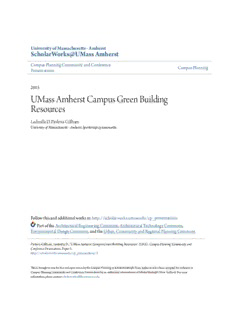
UMass Amherst Campus Green Building Resources PDF
Preview UMass Amherst Campus Green Building Resources
University of Massachusetts Amherst ScholarWorks@UMass Amherst Campus Planning Community and Conference Campus Planning Presentations 2015 UMass Amherst Campus Green Building Resources Ludmilla D. Pavlova-Gillham University of Massachusetts - Amherst, [email protected] Follow this and additional works at:https://scholarworks.umass.edu/cp_presentations Part of theArchitectural Engineering Commons,Architectural Technology Commons, Environmental Design Commons, and theUrban, Community and Regional Planning Commons Pavlova-Gillham, Ludmilla D., "UMass Amherst Campus Green Building Resources" (2015).University of Massachusetts, Amherst. 2. Retrieved fromhttps://scholarworks.umass.edu/cp_presentations/2 This is brought to you for free and open access by the Campus Planning at ScholarWorks@UMass Amherst. It has been accepted for inclusion in Campus Planning Community and Conference Presentations by an authorized administrator of ScholarWorks@UMass Amherst. For more information, please [email protected]. UMass Amherst Campus Green Building Resources Presentation Overview 1. Sustainability Timeline and Commitments 2. Overview of Green Buildings LEED LEED Certified Facilities Public Resources 3. Overview of LEED Staff Resources LEED Scorecard Green Building Guidelines and related documents Energy Modeling Guidelines Education Credits Post-Occupancy LEED v4 4. Discussion and Questions UMass Amherst Sustainability Timeline 2004-07 2008-09 2010 - 11 2012 - 13 2014 - Today •A&F •Interim •2010 •EPAC Publishes •UMass Bulletin – Chancellor Cole EPAC CAP 2.0 & Achieves MA LEED creates EPAC publishes becomes STARS v1.2 Plus (2006) campus’s Chancellor’s Gold -71 (top •Eco Rep Program •Design launched inaugural Sustainability 8) Guidelines Climate Committee •GHG emission •Campus hires with Action Plan •UMass wins the reporting first part-time Responsibl (CAP) White House expands to sustainability e Use of •2011 Champions of employee coordinator Energy & UMass Change award travel & •Green Building Natural Amherst •300+ commuting Guidelines Resources Achieves Sustainability •Princeton Published (2004) STARS Gold Courses/11 Review Honor •Commitment to •EO 484 – Rating – 66 Programs Roll certify at LEED MA LEED pts. •Sustainability •Master Plan Silver or better Plus (2007) •Permaculture Innovation & Sustainability •President garden Engagement Chapter Wilson begins Fund •Energy Master signs winning •Chancellor Plan and Solar ACUPCC awards commits to Real PPA to procure Town of (2007) •Campus hires Food Challenge renewables on Amherst full-time campus Climate Action sustainability Plan 2005 manager MA A&F Green Building Commitments - 2006 A&F Bulletin 12 – Established Minimum Standards for Sustainable Design and Construction of New Buildings and Major Renovations by Executive Agencies 8/11/2006 Major renovation projects are defined as those projects that include a complete overhaul of a significant portion of the original structure and where the cost of the renovation is greater than 50% of the assessed value of the building Higher up-front cost shall not preclude construction unless costs cannot be justified with a payback of 10 years or less MA LEED Plus Standard - 2006 For projects over 20,000 GSF obtain LEED Certification Plus following specific credits within LEED-NC v2.2 • Energy performance exceeding MA Energy Code requirements by at least %20 (EA c1) • Third party building commissioning (EA c1, c3) • At least one of the four Smart Growth criteria SS c2 - construct or renovate on a previous developed site or within a ½ o mile of ten basic services and a residential neighborhood with average density of 10 units/acre and with pedestrian access between buildings and services SS 3 – construct or renovate on a brownfield site o SS 4.1 – construct or renovate on a site with public transportation within o ½ mile MR c1.1 – maintain 75 percent of existing building structure and envelope o • Two irrigation and building water efficiency criteria WE c1.1 – reduce potable water consumption for irrigation by 50 percent o WE c3.1Incorporate strategies that will conserve %20 of building water o use Executive Order 484 (facility requirements) - 2007 New construction & major renovation projects larger than 20,000 GSF (LEED Plus) • LEED + 20% better energy performance (LEED-NC v2.2) • 50% reduction in irrigation water consumption and 20% reduction in building water use • Building Commissioning • Smart Growth criteria Projects smaller than 20,000 GSF • LEED Plus or 20% better energy performance or New Buildings Institute’s Advanced Buildings Benchmark prescriptive approach Major renovation projects definition: complete overhaul of a significant portion of the original structure where the cost of the renovation is greater than 50% of the assessed value of the building Higher first costs justified with LCCA of 10 year payback or less ACUPCC UMass President Jack Wilson signed the American College and University President’s Climate Commitment in 2007 Climate Action Plan approved in 2010 and updated in 2012 Identifies strategies to help the campus reach carbon neutrality by 2050 Campus achieved Second Nature Climate Leadership Award 2014 http://www.umass.edu/sustainability/about/climate-action-plan UMass Amherst Commitment Obtain LEED Silver certification or better for all new construction and major renovation projects (2008) GOING BEYOND LEED is one tool in the quest for a more sustainable built environment. The GBC is using LEED to help steer sustainable design and building on campus. However, the GBC is aware that LEED is a limited approach to sustainable building. For this reason, we continue to look beyond LEED, towards more integrative and holistic environmental design. http://www.umass.edu/fp/gbGuidelines.pdf Green Building Subcommittee Charge The Green Building Committee (GBC) is a cross disciplinary group of faculty, staff, and students committed to building a more sustainable campus. Through research and advocacy, the GBC addresses how new buildings are designed and constructed, campus landscape is maintained, and existing buildings are operated: http://www.umass.edu/sustainability/get-involved/green-building-subcommittee The committee is currently chaired by Ted Mendoza of Design & Construction Management
Description: